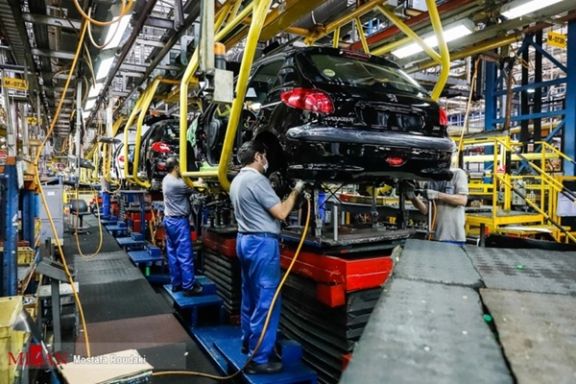Iran's Auto Industry Plagued With Daily Losses Of $3.7 Million

An Iranian auto industry expert says the country’s state-owned carmakers are incurring daily losses of $3.7 million, totaling over one billion dollars annually.

An Iranian auto industry expert says the country’s state-owned carmakers are incurring daily losses of $3.7 million, totaling over one billion dollars annually.
Farhad Ehteshamzad, the head of Iran Auto Importers Association, said in an interview Friday that the huge loss is the direct result of the government’s interventions in the auto industry.
Iran’s car industry is mired with a wide range of problems. The main manufacturers are owned by the state and enjoy huge incentives and support from the government. Despite the losses, Iran’s automotive industry is the third most active industry in the country, after oil and gas sectors, accounting for about 10% of Iran's GDP and 4% of the workforce (700,000 persons).It was valued in 2020 at $26.4 billion by India-based Modor Intelligence, which forecasts 10 percent sectoral annual growth to 2026. This would be possible without sanctions and with a new infusion of investments and foreign partnerships.
However, the carmakers are unable to satisfy domestic demand and they keep raising prices to levels several times higher than international prices of similar cars. This is partly the reason why imported cars are also expensive. For example, one Tehran showroom was selling an unused 2017 Mercedes-Benz E 200 class for about six times the price of the newest model in global markets. The government has long restricted car imports, turning the country into a vast parking lot of dilapidated cars. In recent years, it announced plans to import cars but the number of units hitting the market insignificant. A total of 241 vehicles were imported in the first quarter of the current Iranian year (March 21-June 21).
There are about a dozen state-and quasi-state-owned automakers in Iran, of which two -- Iran Khodro and Saipa -- accounted for 94% of the total domestic production, with nearly 1,500,000 units of light and heavy vehicles produced annually, mostly sub-standard and older foreign models. Criticizing Iranian automakers for low-quality vehicles responsible for a high rate of road accident casualties, Iran’s traffic police said last year that substandard and unsafe cars lead to at least 17,000 deaths and 300,000 injuries every year.

Ehteshamzad added that considering the huge loss of the state-run carmakers, decisions should be made whether to privatize these companies. He said, "For this industry, significant investments have been made, and a substantial amount of money has been spent to reach this point. If this industry collapses, we will lose a considerable amount of capital."
Highlighting the complexities and dangers of privatization, fraught with corruption in Iran, he said decisions about such fundamental steps need to be made at the highest levels of government. Criticizing the unrealistic figures in the administration's budget bill, he said that the government has set a revenue target of 320 trillion rials ($640 million) from high import taxes on cars.
For years critics and politicians have criticized the government-controlled auto industry and have referred to a “mafia” running the money-losing and inefficient sector. In 2019, it was revealed that these carmakers owed $9 billion, a considerable sum in Iran, due to corruption and mismanagement. "Widespread financial corruption has turned automakers in Iran into a powerful Mafia," a lawmaker said at the time. In 2019, the then CEO of Iran Khodro was arrested on charges of corruption and several managers from Saipa are also in jail.
Also on Friday, another car industry expert Hassan Karimi Sanjari criticized the high price of foreign cars assembled in Iran, saying that a Chinese car that costs around $10,000 is sold for about $30,000."In addition to huge profits, mismanagement in assembly companies has also affected prices, leading to increased costs for assembled cars, ultimately borne by the people. On the other hand, for assembled cars, a monopolistic market has been created, resulting from inflation, sanctions, and the insufficient import of cars to meet demand."
According to Ehteshamzad, the government is only providing lip service to Iran’s car industry, making the sector stuck in a quagmire of “speech-therapy” in a sense that officials only deliver speeches about the car industry instead of acting to deliver results.